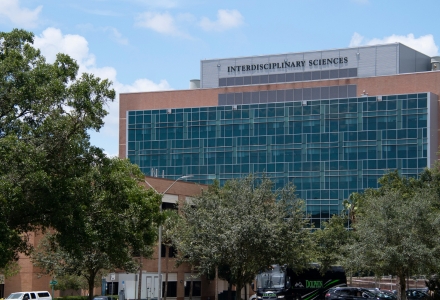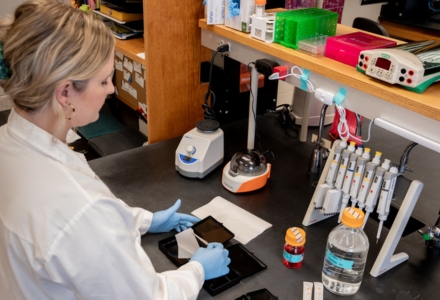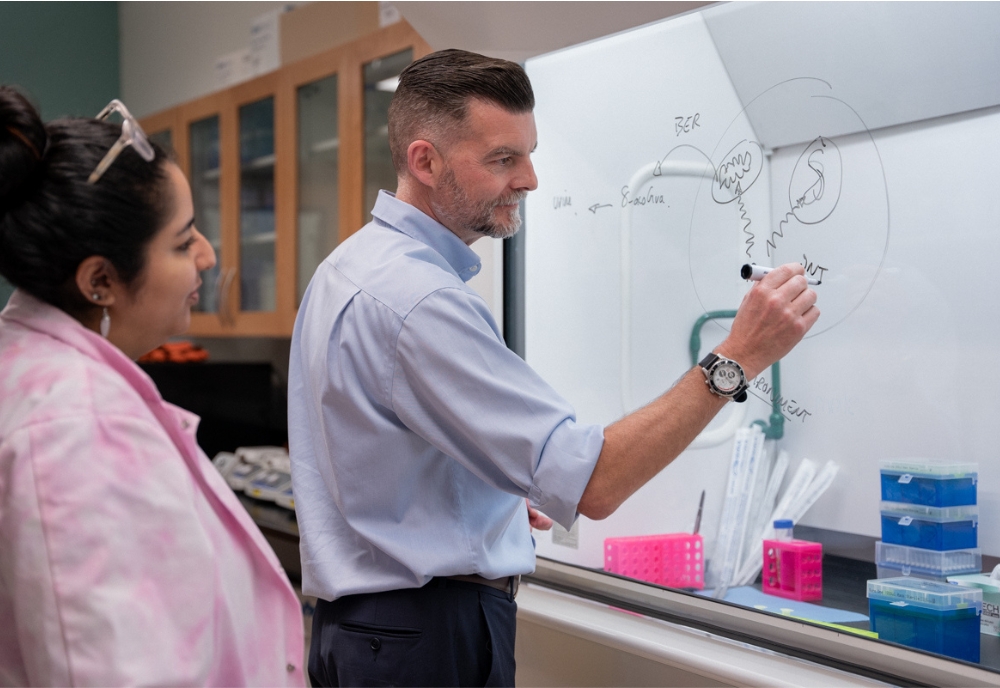The Department of Cell Biology, Microbiology and Molecular Biology at the USF College of Arts and Sciences welcomes a more succinct and up-to-date name this academic year.

The Department of Molecular Biosciences is largely housed in the Interdisciplinary Sciences (ISA) and Bio-Sciences (BSF) buildings at USF. The department also has faculty housed Interdisciplinary Research Building (IDRB). (Photo by Corey Lepak)
It has officially been renamed the Department of Molecular Biosciences.
“The name change was needed because the old department name was a catch-all name, to cover the diverse interests of the then faculty. But it was long, unwieldy, repetitive, contained redundancy, and many people simply got the name wrong,” said Dr. Marcus Cooke, professor and chair of the department.
“This streamlined name makes marketing of the department considerably easier, leading to better/easier/consistent name recognition,” Cooke said. “This makes a difference during peer review for grants and manuscripts, and when presenting at national/international meetings. Collectively, this leads to increased stature and visibility, and ultimately, reputation. It is part of an ongoing rebranding, renewal, and revision for the department, as we refine our areas of biomedical research focus, and increase yet further our alignment with the university strategic plan.”
In addition to the name change, Cooke, who has just completed his first year as chair, said one of his other main goals is to continue with an upward trajectory for the department in prominence, both at USF, nationally, and internationally.
Under his leadership, the department has also reviewed and revised its areas of emphasis to “better reflect the work we do,” he explained.
Those main areas of emphasis include bacterial pathogenesis, biomedical science, genome integrity, molecular biophysics and systems biology, and STEM education.

MBS PhD student Alexis Coiner is investigating hepatic epigenetic mechanisms of alcohol use disorder in vivo and in vitro utilizing novel techniques in mass spectrometry, immunofluorescent microscopy, flow cytometry, and qRT-PCR. (Photo by Alessandra Casanova)
“We want students to know that they will receive a first-class education in the biomedical sciences, led by internationally renowned scientists. This education will be excellent preparation for careers in the health sciences, the pharmaceutical industry, and medicine, which includes further study to the master’s, MD, and PhD levels,” Cooke said. “Additionally, students get that rare opportunity to engage in research, at both the undergraduate and graduate levels, allowing them to be involved in cutting edge discoveries.”
When asked what he loves most about being chair of this department, he said it’s “the people.”
“I’ve spent nearly 30 years in academia, and I don’t think I’ve met a more collegial group of people – students, staff, and faculty. They’re kind, friendly, and have a can-do attitude. Oh, and they’re also some of the best minds in their respective fields!”
Learn more about the Department of Molecular Biosciences.
